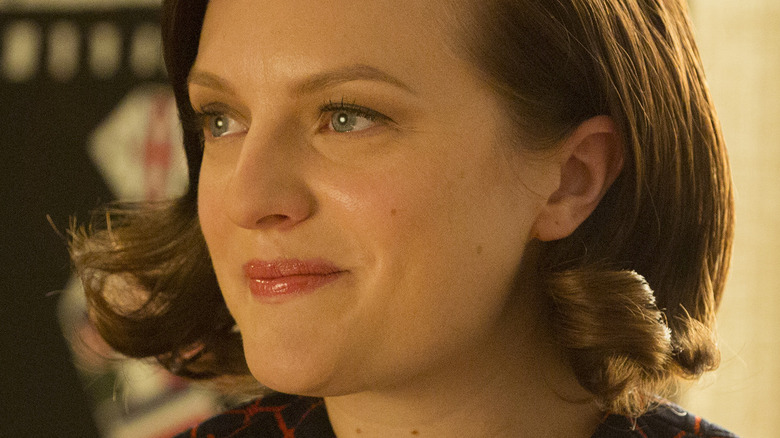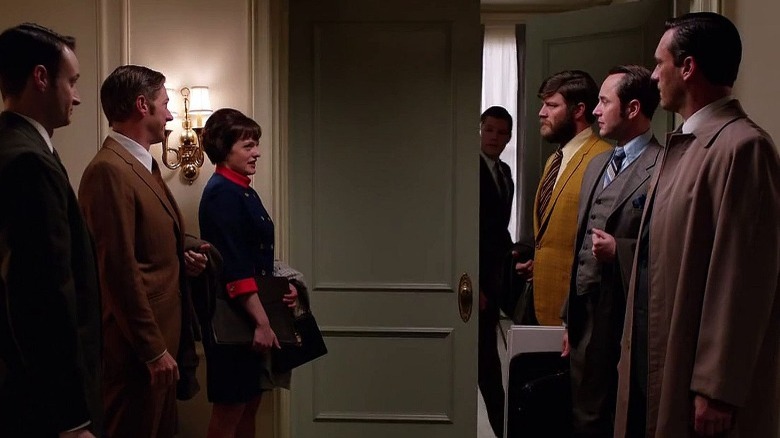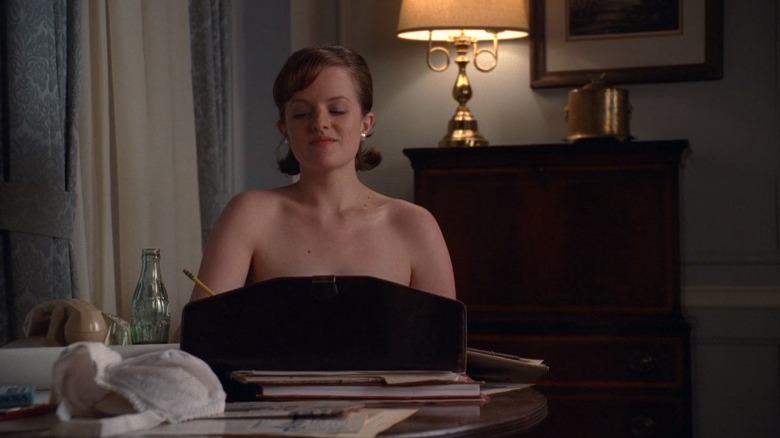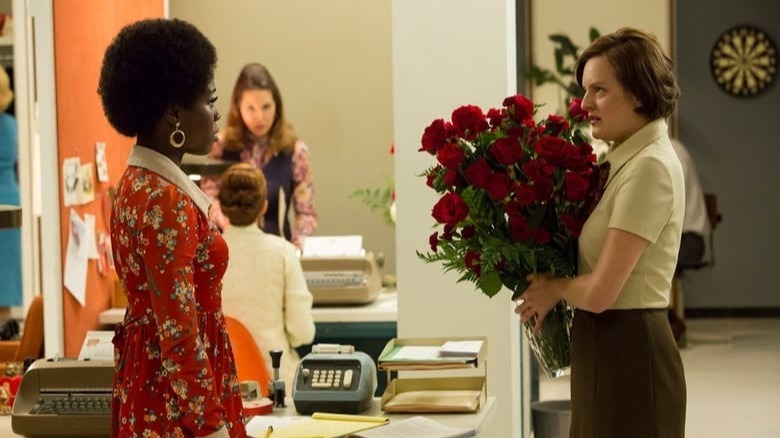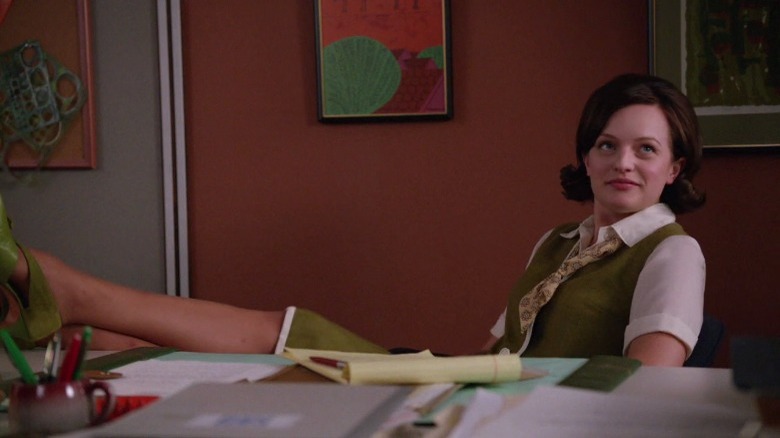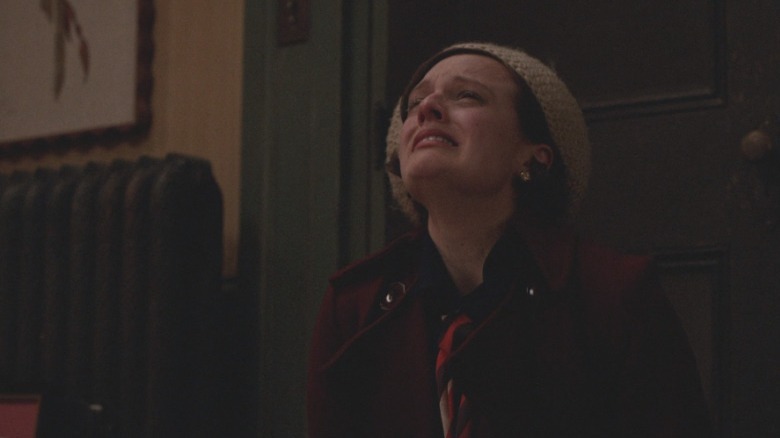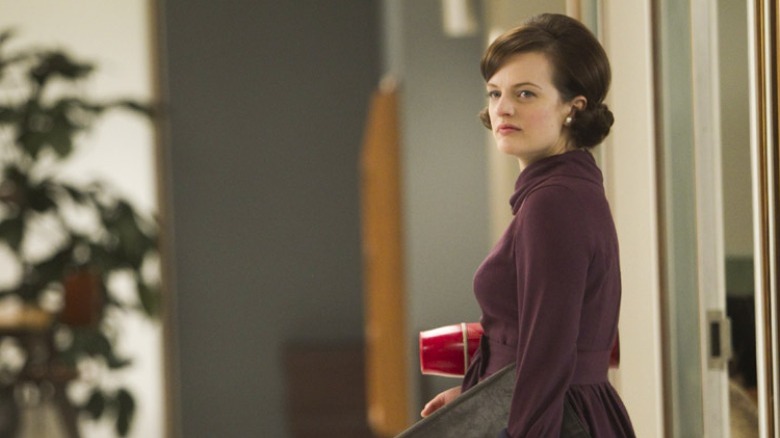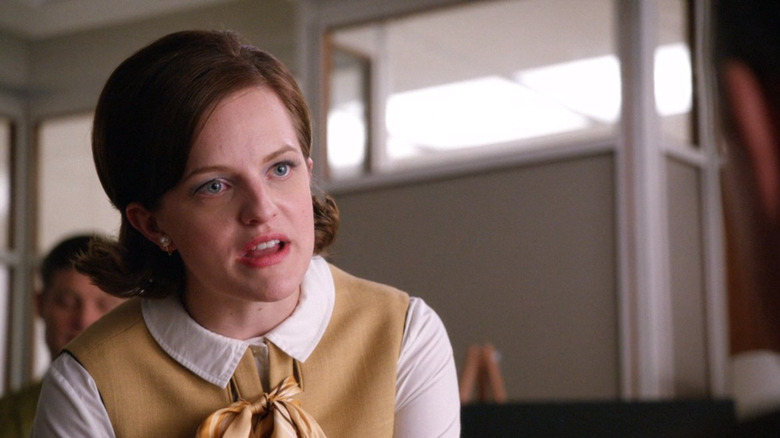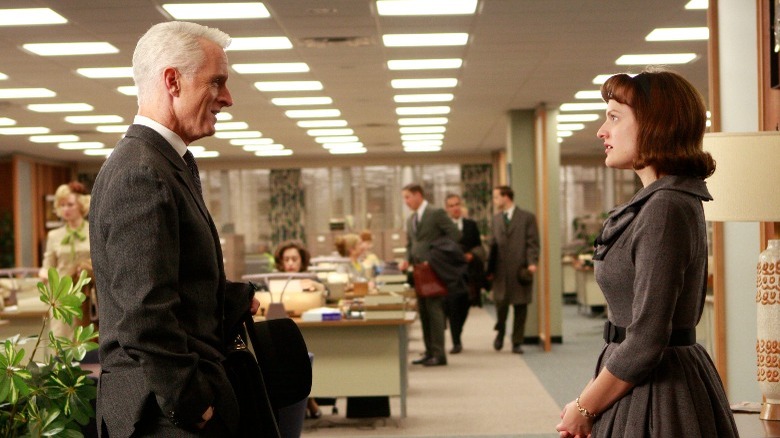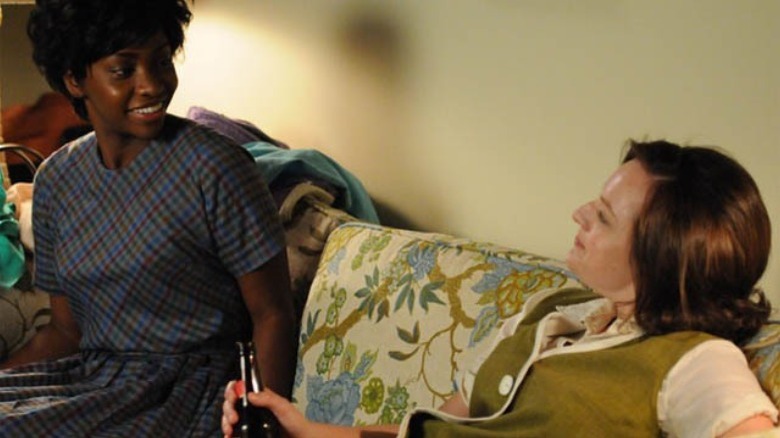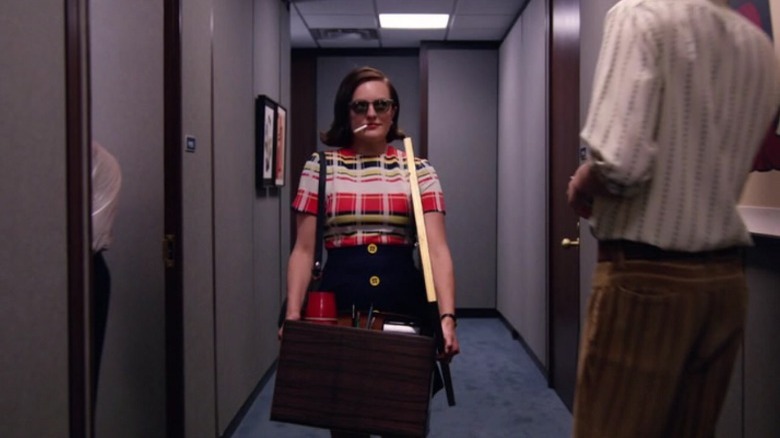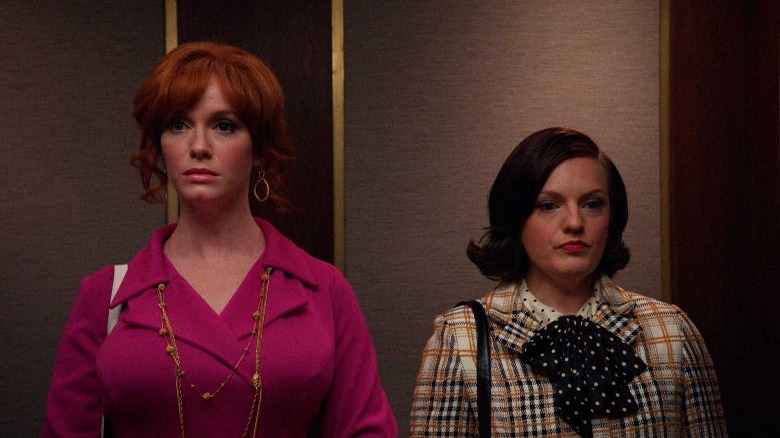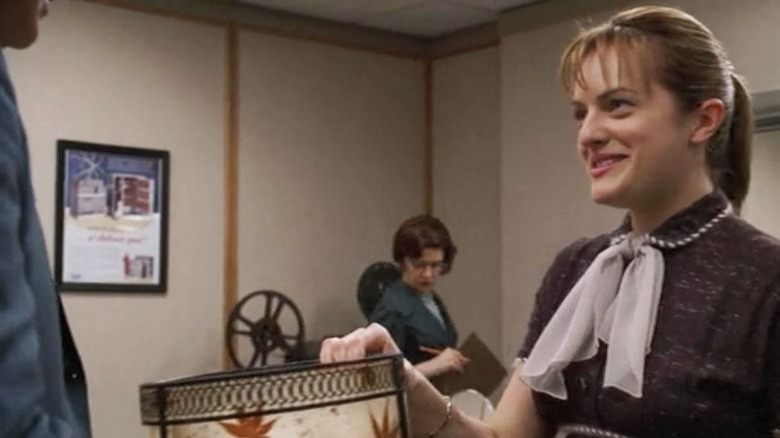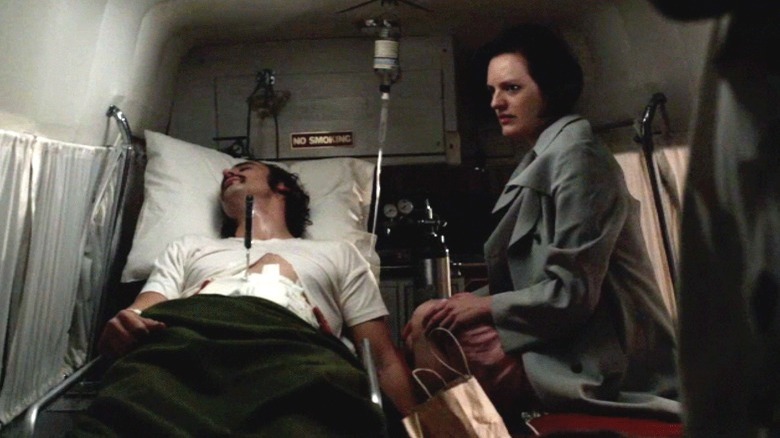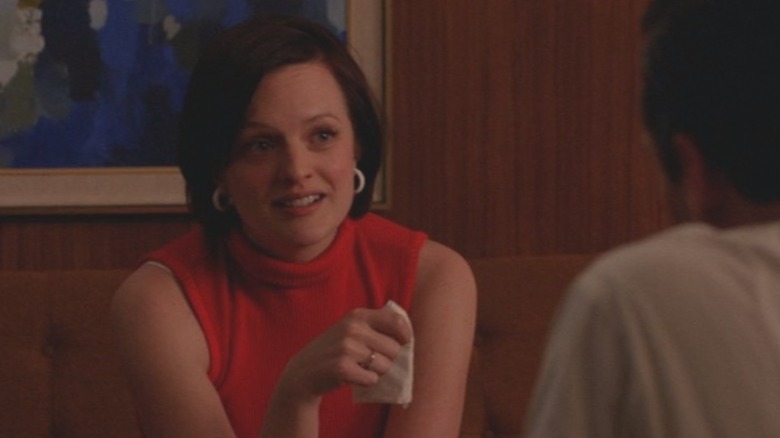Peggy Olson's 7 Best And 7 Worst Mad Men Scenes Ranked
Elizabeth Moss had arguably the hardest role to play on "Mad Men" as second-billed lead character Peggy Olson. No matter how badly Don Draper (Jon Hamm) behaves, he's protected by his status as the main character of the show. The audience is primed to find him sympathetic. Don is also a cipher for the story itself, which explores the changing spirit of the 1960s and the corrupting influence of Madison Avenue. It's the rest of the cast, with Peggy in the lead, that makes "Mad Men" feel like it takes place in a recognizably human world. Normal people have to keep going to work when Don Draper disappears on a whim.
Over the course of seven seasons, Peggy acts as our real point of view character. She goes from being a nervous secretary to a confident copy chief, transforming herself several times in the process. Her style evolves with the years, and always speaks to Peggy's unique sensibility. Peggy is, in many ways, an avatar of the aspirational feminism of the '60s and '70s — but she also always feels like a flawed, human character. In celebration of this complexity, we're ranking Peggy Olson's 7 best and 7 worst "Mad Men" scenes.
14. Worst: Breaking Stan's trust with Heinz
Although Peggy's sudden realization that she loves Stan (Jay R. Ferguson) in the series finale is a little unexpected, her series-long friendship with him is one of the most appealing things about her. Even after Peggy leaves Sterling Cooper Draper Pryce for its bitterest rival, Cutler Gleason Chaough, she and Stan maintain their habit of spending long nights chatting on the phone together. It's during one of these conversations in Season 6's "To Have and to Hold" that Peggy learns vital intel, which she inadvertently uses against her friend.
Granted, advertising is a dog-eat-dog industry. And it's not as if Peggy and Stan are "off the record" in any official sense when he mentions that Heinz Ketchup is taking pitches. But when Stan sees Peggy and the CGC team in the hotel hallway where their supposedly secret pitch meeting is taking place, you can tell he instantly knows what's happened. Their friendship recovers, but Peggy earns a cold shoulder and middle finger from one of her closest friends when they meet later in a bar. Heinz ultimately goes with a different agency anyway, so her betrayal isn't even really worth it. Funnily enough, in real life, Heinz eventually ran SCDP's pitch after all.
13. Best: Beating Stan at his own game
In Season 4's "Waldorf Stories," Peggy neutralizes an annoying new coworker and defies perceptions of her as prudish and uptight in one stunning scene. After an entire week of putting up with Stan's boorish behavior (especially his claims that man wasn't meant to wear clothes), Peggy is assigned to work out of a hotel room over the weekend with him. Fed up with his posturing, Peggy starts to strip down to her skivvies and calls his bluff (or calls his buff, if you'll forgive the pun). "Let's get liberated," she says, confidently.
It's a cathartic moment for Peggy, as she's able to get right back to work while Stan is noticeably distracted, and clearly not as free-spirited as he claimed. In this moment, after years of either being overlooked or harassed for being a woman, Peggy takes the narrative into her own hands. The dynamic between her and Stan is changed from that moment forward: They go from bickering rivals to respected peers and eventually close friends.
12. Worst: Taking Shirley's flowers
You'd think the employees of an ad agency, of all people, would have an innate understanding of Valentine's Day's complexities — the holiday is one of the most commercialized, after all. But Peggy is feeling the pressure in Season 7's "A Day's Work," especially since her recent affair with Ted (Kevin Rahm) has come to an abrupt end. She engages in a series of misadventures after she sees a bouquet of roses on her secretary Shirley's (Sola Bamis) desk. If Peggy has a recurring flaw, it's a very Don-Draper-esque narcissism: She assumes the flowers are for her, and takes them into her office.
As the roses arrived without a note, Peggy comes to believe they're a tasteless gesture from Ted, who's moved to California with his family. She leaves him a dismissive message. Shirley finally admits the mix-up — the flowers are for her. Peggy's reaction is to yell and blame Shirley for letting her embarrass herself all day — she doesn't give any thought to the awkward position she put Shirley in. Her solution to this is to ask Joan for a new secretary and avoid any resolution or apologies. Even with the pressures of Valentine's Day taken into account, Peggy is at her worst in this episode.
11. Best: Blackmailing Roger
In Season 5's "Mystery Date," we really start to realize how far Peggy has come from her days as a mousy, timid secretary. When Roger (John Slattery) needs some off-the-books last-minute work to make himself look good during a client meeting with Mohawk Airlines, Peggy is the only copywriter still in the office for him to ask. He hands her a 10 dollar bill and asks her to come up with an entire ad pitch, without any briefing materials or starting points. Moreover, he needs her to lie to her coworkers about when he asked her to do it. She immediately sees an opportunity. "The work is 10 dollars," she tells him. "The lie is extra."
Back in the day, Peggy would be flustered just speaking to one of the partners of the agency. But she's evolved into Don's right-hand woman at the new SCDP, and after dozens of successful campaigns, she understands the value of her work. In one of her most iconic deliveries in the entire series, when Roger asks why she's driving such a hard bargain, Peggy leans back in her chair and says, "Because you're being very demanding for someone who has no other choice. Dazzle me." She then proceeds to take all 400 dollars Roger has on him.
10. Worst: Breaking down in tears at home
Although "Mad Men" is a show defined by a melancholy sense of loneliness, few characters make you feel that loneliness like Peggy. In many ways, Don lives a life apart from other people, as he lies about his identity and traps himself in prisons of his own making. But Peggy never hides herself from anyone and still struggles to find her own way. Season 7's "Time Zones" sees Peggy reach her lowest point since her Season 1 pregnancy when she breaks down in tears in a quiet moment.
The scene is intensely relatable in its mundanity: Peggy hasn't been through anything particularly tragic, it's just the slow drip of tension and sadness reaching a saturation point. She's single, struggling to maintain the building she bought with Abe, and spinning her wheels uselessly at work as the new creative director brought in to replace Don doesn't see her value. Without a word of dialogue, Peggy melts to the floor after a long day and begins to cry. It's an eminently understandable act: Who hasn't endured a moment in which you ask yourself, "What is it all for?"
9. Best: Leaving SCDP
Sometimes, the only way to understand ourselves is to leave the place we come from. After some prodding from Freddy Rumsen (Joel Murray) and years of being overshadowed by Don without getting proper credit, Peggy makes the decision to leave Sterling Cooper Draper Pryce for a competing firm in Season 5's "The Other Woman." When she tells Don, she's incredibly gracious about it, and once again has to endure a tantrum from him before he remembers how to be a human being. It's an emotionally charged moment of real sorrow, but Don has no argument when she says, "You know this is exactly what you would do."
Uncharacteristically, Peggy gathers her things without talking to anyone else and heads for the elevator. With the whole office celebrating landing the Jaguar account, she slips out completely unnoticed. Peggy glances back at SCDP for just a moment before she breaks into a smile and walks off into a new future. In an industry based around commodified nostalgia, Peggy is always looking forward.
8. Worst: Losing her cool with Heinz
Season 5's "Far Away Places" finds Peggy struggling with the Herculean task of trying to make Heinz baked beans interesting. After a month of stress, which she takes out on her boyfriend Abe (Charlie Hofheimer), Peggy delivers a long-awaited presentation for the "Home is where the Heinz is" slogan — only to have the client not quite feel it, yet again. Instead of accepting unhappy clients as the cost of doing business, Peggy does her best Don Draper impression and attempts to bully the client into accepting it.
Before long, she's right in the client's face accusing him of just wanting to fight. "You have to run with this," she demands. "It's young, and it's beautiful, and no one else is going to figure out how to say that about beans." But instead of Don's cool, judgmental detachment, Peggy is clearly angry and confrontational. She ends up getting removed from the business, which is just as well. Creativity is an art, but advertising is a business, and Peggy still has a lot to learn about reconciling the pride she takes in her work with the frustrating whims of the clueless suits footing the bill.
7. Best: Asking for her own office
As the first female copywriter at Sterling Cooper, Peggy has to fight for each and every piece of legitimacy. At first, she's writing copy in addition to her duties as Don's secretary. But then, she gets properly promoted. Season 2's "The Mountain King" finds Peggy sharing an office with the photocopier, interrupted endlessly by co-workers and scolded on everyone's behalf by the maintenance man. Tired of not having an office that befits her new status and enduring the company's stasis with Don AWOL in California, Peggy makes her play.
She approaches Roger, obviously the more convivial and generous of the two senior partners, and asks for Freddy Rumsen's now-vacant office, which he immediately grants. Impressed, he tells her, "There's 30 men out there that didn't have the balls to ask me." Indeed, she's the immediate envy of Paul (Michael Gladis) and Harry (Rich Sommer), who are stunned to be outgunned in ambition by the secretary they used to make fun of.
6. Worst: Awkwardly glancing at her purse in front of Dawn
Peggy might be progressive, but she's also self-interested — recall the moment she makes sure not to hire another female copywriter when reviewing submissions. In the Season 5 episode "Mystery Date," we see that the word "intersectional" isn't in Peggy's vocabulary either when Dawn (Teyonah Parris) stays at her apartment due to ongoing riots throughout the city. Though this situation obviously weighs on Dawn in unique and intense ways, Peggy gets drunk and mostly talks about herself.
As awkward as the conversation is, between Dawn's general tact and Peggy's good intentions, they get through it. But when Peggy gets up to go to bed, she glances at her purse on the coffee table and freezes up for a painfully interminable moment. She looks up at Dawn, who knows exactly what Peggy is thinking. Peggy awkwardly throws away some beer bottles and leaves the purse there, but the hesitation reveals something instinctive and unmistakable.
5. Best: Walking into McCann like a boss
Perhaps the most iconic image from the final season of "Mad Men" is Peggy walking into the offices of McCann-Erickson. She sports sunglasses, an unlit cigarette dangling from her lips, and carries an obscene Japanese painting from the late Bert Cooper's office under one arm. After the giant company absorbs SCDP in "Lost Horizon," Peggy defiantly waits out the delay in getting her new office at McCann by getting drunk and palling around with Roger in their old space. After considering leaving, Peggy follows the advice of a headhunter and resolves to further her career by making waves at a huge agency for a few years.
If Don Draper is the man in the suit in the intro to "Mad Men," a black and white symbol of masculinity trying to avoid a precipitous fall, Peggy serves as his opposite: A colorful figure steadily marching forward. As the show draws to a close, Peggy is the character who is most confident in her path and identity.
4. Worst: Implying harassment is Joan's fault
Peggy and Joan (Christina Hendricks) have a complex relationship. Joan is happy to give Peggy advice when she's new and clueless, but has little patience for Peggy as she charts her own path. Peggy isn't always sure what to make of Joan's steely resolve. As the two most powerful women at SCDP, they occasional butt heads with their entirely different approaches to navigating a male-dominated workplace. But all of that goes completely out the window after the agency is acquired by McCann-Erickson. The first meeting Peggy and Joan have with the (all male) McCann execs in "Lost Horizon" is an infuriating ordeal of constant sexism.
In the elevator afterwards, instead of bonding with Joan when she voices her fury and disappointment, Peggy expresses skepticism that this has never happened to Joan before. After all, Peggy says, "You can't dress the way you do and expect — " before Joan angrily cuts her off. What could have been a moment of solidarity devolves into yet another argument about the fundamental differences between them.
3. Best: A basket of kisses
It's not until Episode 6 of "Mad Men," Season 1's "Babylon," that Peggy's arc starts to reveal itself. In the early episodes, she's the new girl in the office saddled with a brief and doomed affair with Pete (Vincent Kartheiser). But when she's called into a focus group test with all the other secretaries for Belle Jolie lipstick, Peggy displays the knack for words and keen observational skills that will change her life. Handing a wastebasket of lipstick-covered tissues to Freddy, she says, "Here's your basket of kisses."
This turn of phrase gets Freddy's attention, but it's her answers to his follow-up questions about the focus group that mark Peggy as a potential copywriter. Somebody took her shade of lipstick, she explains, so she didn't really participate. "I don't think anyone wants to be one of a hundred colors in a box," she remarks. Although Freddy describes this moment to Don as condescendingly as possible, he becomes a true believer in her talent from that moment forward. Soon enough, Don joins him.
2. Worst: Accidentally stabbing Abe
Peggy's romance with Abe always seems like a fundamental mismatch. Despite their good chemistry, her job in advertising is always in direct conflict with the principles he holds as an anti-capitalist journalist. Nevertheless, they stay together for years, and even move into a duplex together (which Peggy owns). After Abe injures his hand in a mugging in Season 6's "The Better Half," Peggy is on edge. She brandishes a kitchen knife taped to a broom handle as she looks out the window, attempting to discern the source of a commotion. When Abe startles her, she wheels around and stabs him right in the gut.
Abe survives, but near-death experiences are often clarifying: He breaks up with Peggy in the ambulance on the way to the hospital. Apparently realizing they've always been fooling themselves, he characterizes Peggy as a fundamentally frightened person. "I don't know why I thought you'd be braver," he says. "You're in advertising." As breakups go, they don't get much more brutal than accidentally stabbing your boyfriend in the stomach and then having him tell you that your career is utterly antithetical to everything he believes in.
1. Best: Thinking up the Burger Chef strategy
Season 4's "The Suitcase" is roundly agreed to be the best episode of "Mad Men," as well as one of TV's best-ever bottle episodes. But as much as it's a two-hander between Don and Peggy, it's still a very Don-centric installment: Peggy's story orbits around his, and she provides him with more comfort than he returns. Season 7's "The Strategy" is something of a companion episode to "The Suitcase," as it finds a much-changed Peggy and Don trapped in the office with an idea they can't crack. As in "The Suitcase," they drink, bond, start from the beginning several times, and finally try again.
After getting Don, at last, to reveal how his mind works, Peggy has her finest moment of inspiration and comes up with the winning Burger Chef strategy. "What if there was a place you could go where there was no TV?" she asks, somewhat ironically for a TV show character. In "The Suitcase," Don's eventual Samsonite pitch is almost an afterthought. In "The Strategy," the moment is all Peggy's, and the mood is so changed by her inspiration, she and Don share a touching slow dance.
